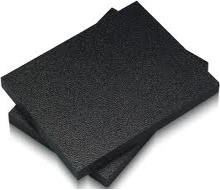ABS is a terpolymer made by polymerizing styrene and acrylonitrile in the presence of polybutadiene. The proportions can vary from 15 to 35% acrylonitrile, 5 to 30% butadiene and 40 to 60% styrene. The result is a long chain of polybutadiene criss-crossed with shorter chains of poly(styrene-co-acrylonitrile). The nitrile groups from neighboring chains, being polar, attract each other and bind the chains together, making ABS stronger than pure polystyrene. The styrene gives the plastic a shiny, impervious surface. The polybutadiene, a rubbery substance, provides resilience even at low temperatures. For the majority of applications, ABS can be used between −20 and 80 °C (−4 and 176 °F) as its mechanical properties vary with temperature. The properties are created by rubber toughening, where fine particles of elastomer are distributed throughout the rigid matrix.
ABS possesses outstanding impact strength and high mechanical strength, which makes it suitable for use in tough consumer and industrial products, including: appliances, automotive parts, pipe, business machines and telephone components. In the 1960s, ABS found wide outlet as a substrate for metallizing (i.e., applying a chrome-like metallic finish to the plastic) and appeared in such products as shower heads, door handles, faucet handles and automotive front grilles.
ABS (Acrylonitrile Butadiene Styrene) is one of the most versatile thermoplastic materials. Because of its impact strength, chemical resistance, color options and excellent aesthetic qualities, a variety of products can be manufactured. ABS can be easily machined making this the material of choice for parts that are turned, drilled, milled sawed, die cut and routed. It is commonly used to make lightweight, rigid products such as automotive parts, piping and laboratory equipment. Other applications include aircraft interior trim, luggage, tote bins and trays, water purification equipment and computer housings.
ABS plastic sheet provides a balanced combination of mechanical toughness and impact resistance with an ease of thermoforming and fabrication.
Key Properties
High Impact Strength
Ease of Fabrication
Good Chemical Resistance
Cost Effective
Lightweight and Strong
Standard Shapes and Forms
Sheet: .030” – .500” thick
Other Forms: Rod and Sheet - see ABS under Engineering Plastics
Grades and Colors
SPARTECH SP-9010
Spartech SP-9010 ABS sheet is the general purpose grade sheet and is engineered to meet demanding thermoforming applications. Combining high impact strength with outstanding mechanical properties, SP-9010 provides an economical alternative to premium high impact ABS systems.
SP-9010 is a medium impact rigid ABS sheet, which provides good physical properties at an effective price.
General Purpose SP-9010 Data
Test Condition Units Value
Specific Gravity ASTM D792 g/cm3 1.04
Tensile Modulus ASTM D638 psi 310,000
Tensile Strength ASTM D638 psi 6,000
Flexural Modulus ASTM D790 psi 340,000
Flexural Strength ASTM D790 psi 10,000
Izod Impact ASTM D256 (73°F, -40°C) Ft-lbs/in. 7.5 2.5
Falling Dart Impact ASTM D3029(73°F, -40°C) Ft-lbs 33 12
Heat Deflection
Temperature ASTM D648 °F 198
Hardness ASTM D785 Rockwell R 105
Gardner Gloss ASTM D523 % 90
Flammability Rating MVSS 302 Passes
UL94 HB Passes
ROYALITE R-59
Royalite R-59 is a unique ABS/PVC product that meets many industry flammability standards. It is recognized under the component program of Underwriters Laboratories Inc. with a classification of 94V-1 at 0.058", 94V-0 at 0.085" and 94-5VA at 0.085". It combines very high impact strength with excellent ductility and formability. Because of its fire rating, Royalite R59 sheet has won acceptance in a variety of applications from rapid transit vehicle interiors to computer and electronic data processing terminals. Its high rigidity in thin gauges coupled with consistent high quality color, texture and gloss makes it ideal for such varied applications as computer side panels and airport seating.
PHYSICAL PROPERTIES (units) VALUES METHODS
Specific Gravity 1.18-1.25 † ASTM D-792
Tensile Strength, 5000 ASTM D-638
machine direction (psi)
Flexural Strength (psi) 7800 ASTM D-790
Flexural Modulus (105 psi) 2.8 ASTM D-790
Impact Strength 8.0 ASTM D-256
@ 72°F (ft-lb/in notch)
Notched Izod @ -20°F (ft-lb/in notch) 1.8
Hardness Rockwell Scale R 93 ASTM D-785
Heat Deflection @ 264 psi (°F) 175 ASTM D-648
Temperature (annealed)
Coefficient of (in/in/°Fx10-5) 4.6-5.5 ASTM D-696
Thermal Expansion
Thermoforming Low (°F) 325
Machine Temperature Range High (°F) 400
Mold Shrinkage (in/in) 0.005-0.007
Flammability Rating:
Motor Vehicle Standard Passes FMVSS 302
Underwriters Lab Listed UL 94 V-0
Underwriters Lab Listed UL 94 5VA
Radiant Panel (Flame Spread Index) Listed UL 94 RP-50
Relative Thermal Index (RTI)
Electrical 85°C UL746
Mechanical w/impact 70°C UL746
Mechanical w/o impact 85°C UL746
ABS (Acrylonitrile Butadiene Styrene) Pictures:
.jpg)




.jpg)


 Member
Member